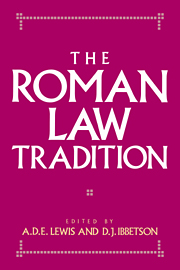Book contents
- Frontmatter
- Contents
- List of contributors
- Foreword: Peter Stein, Regius Professor of Civil Law in the University of Cambridge, 1968–1993
- List of abbreviations
- 1 The Roman law tradition
- 2 Labeo and the fraudulent slave
- 3 Doing and causing to be done
- 4 The danger of definition: contrectatio and appropriation
- 5 Going to the fair – Jacques de Révigny on possession
- 6 Bembo giureconsulto?
- 7 Gentilis and the interpretatio duplex
- 8 Ius gentium in the practice of the Court of Admiralty around 1600
- 9 Stair's title ‘Of Liberty and Servitude’
- 10 The actio communi dividundo in Roman and Scots law
- 11 Sale and transfer of title in Roman and Scots law
- 12 ‘What Marcellus says is against you’: Roman law and Common law
- 13 Audi et alteram partem: a limit to judicial activity
- Index of sources
- Index of names and subjects
7 - Gentilis and the interpretatio duplex
Published online by Cambridge University Press: 08 October 2009
- Frontmatter
- Contents
- List of contributors
- Foreword: Peter Stein, Regius Professor of Civil Law in the University of Cambridge, 1968–1993
- List of abbreviations
- 1 The Roman law tradition
- 2 Labeo and the fraudulent slave
- 3 Doing and causing to be done
- 4 The danger of definition: contrectatio and appropriation
- 5 Going to the fair – Jacques de Révigny on possession
- 6 Bembo giureconsulto?
- 7 Gentilis and the interpretatio duplex
- 8 Ius gentium in the practice of the Court of Admiralty around 1600
- 9 Stair's title ‘Of Liberty and Servitude’
- 10 The actio communi dividundo in Roman and Scots law
- 11 Sale and transfer of title in Roman and Scots law
- 12 ‘What Marcellus says is against you’: Roman law and Common law
- 13 Audi et alteram partem: a limit to judicial activity
- Index of sources
- Index of names and subjects
Summary
One of the reasons for which, in Maitland's opinion, the history of English law was not written was that much mediaeval English legislation remained in force:
That process by which old principles and old phrases are charged with a new content, is from the lawyer's point of view an evolution of the true intent and meaning of the old law; from the historian's point of view it is almost of necessity a process of perversion and misunderstanding … I make no doubt that it is easier for a Frenchman or a German to study medieval law than it is for an Englishman; he has not before his mind the fear that he is saying what is not ‘practically sound’, that he may seem to be unsettling the law or usurping the functions of a judge.
The sixteenth-century student of Justinian's compilations was in much the same difficulty as the nineteenth-century student of the mediaeval sources of English law. His predecessors had been content to treat the compilations as a code. No doubt the provisions of any code have a history, but what that history may have been is a curious rather than an important question for the expositor who is considering their present application, and the glossators had either ignored historical questions altogether, or treated them very casually. D.29.2.60 is an extract from Javolenus’ epitome of Labeo's Posteriora.
- Type
- Chapter
- Information
- The Roman Law Tradition , pp. 104 - 118Publisher: Cambridge University PressPrint publication year: 1994

